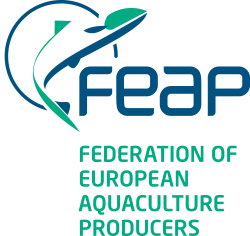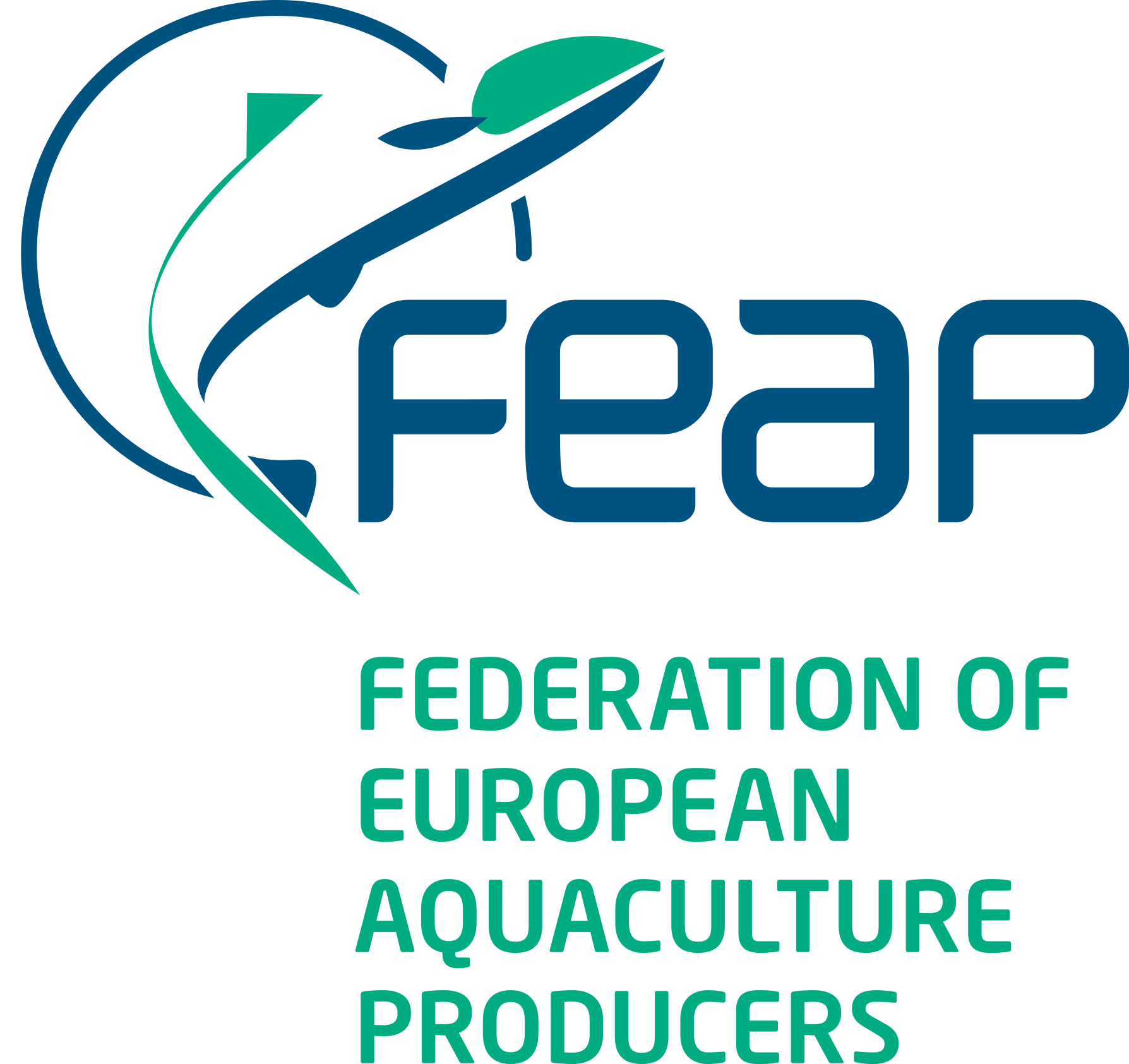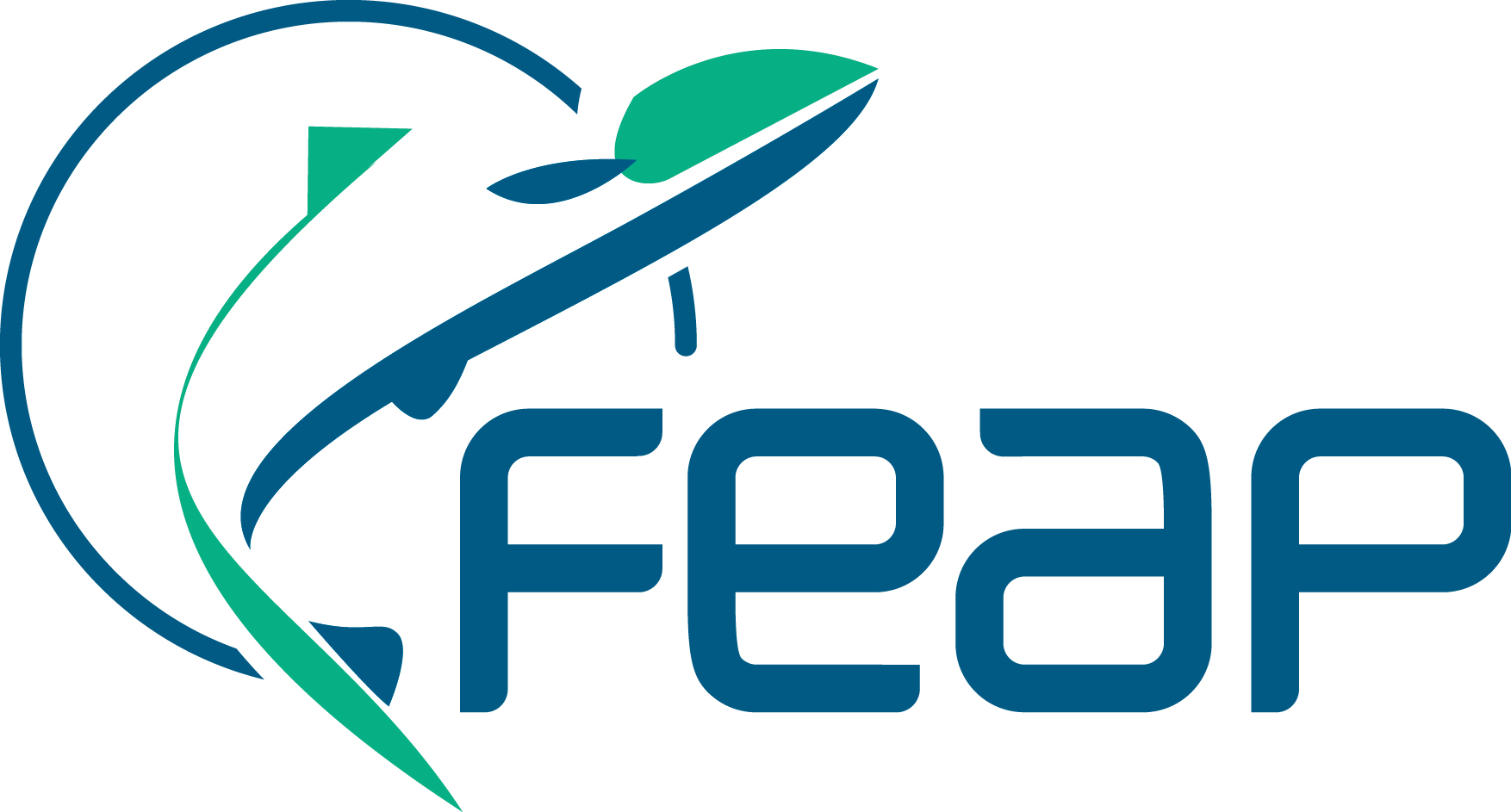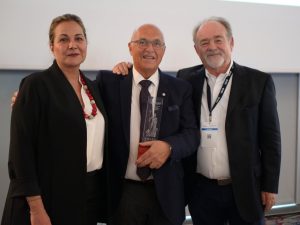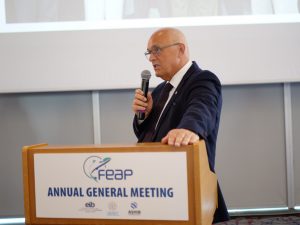
During the 37th Annual Meeting of the Federation of European Aquaculture Producers, which was held in the beautiful Greek island of Hydra, the first presentation was made of the FEAP Award for Excellence in European Aquaculture.
This award is to be made annually to a person who has excelled in their contribution to the development of European aquaculture.
The FEAP Award for Excellence in European Aquaculture used to be represented by a specially-commissioned beautiful silver statue of Poseidon, and each recipient received a smaller replica. Since 2022, the Award has a new transparent and designed look.
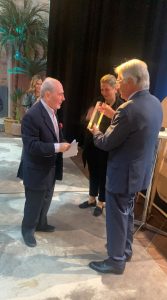
Award presented by Gustavo Larrazabal, 2023 Award recipient to John Stephanis, 2025 Award alongside Ms Lara Barazi, FEAP President
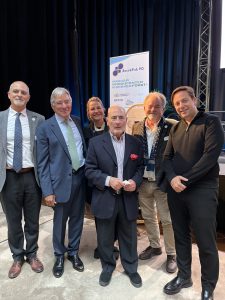
From left to right: Javier Ojeda, Gustavo Larrazabal, Lara Barazi, John Stephanis (2025 FEAP Award), Marco Gilmozzi, Sinan Kızıltan
The 2025 FEAP Award was presented to John Stephanis, a visionary leader and a cornerstone of the European aquaculture industry. With a career marked by innovation, dedication, and impact, Mr. Stephanis has left an indelible mark on the sector.
As the Managing Director of Selonda Aquaculture S.A., one of Greece’s pioneering companies in bass and bream farming, Mr. Stephanis led Selonda to become the first aquaculture company in Europe to be listed on the Athens Stock Exchange—an achievement that highlighted not only the company’s growth but also the increasing significance of aquaculture in the European economy.
Beyond his corporate achievements, John Stephanis has been a tireless advocate for industry-wide collaboration and representation. In 1994, under his initiative, Greece joined the European Federation of Salmoniculture (FES). This milestone led to the transformation of the federation into the Federation of European Aquaculture Producers (FEAP), expanding its scope to all aquaculture species and paving the way for broader Mediterranean involvement through the creation of the MedAqua Commission.
Serving as President of FEAP from 2003 to 2010, Mr. Stephanis became the first Mediterranean marine farmer to lead the federation. His presidency was marked by efforts to foster cooperation across Europe, particularly in marketing and promotional strategies, thereby strengthening the industry’s collective voice.
His contributions extend further through his foundational role in the European Aquaculture Technology and Innovation Platform (EATiP), where he helped shape strategic research and innovation agendas in support of sustainable aquaculture across the continent.
John Stephanis is more than a business leader—he is a pioneer, a collaborator, and a passionate advocate for the future of European aquaculture. We are honored to recognize his outstanding achievements and lifelong dedication with this award.
The FEAP Award represents the recognition by the federation of the exceptional contribution, by an individual, to the development of fish farming in Europe. The person selected to receive this acknowledgement is decided by the previous recipients of the award following the proposals received from national fish farming associations throughout Europe.
The recipient of the FEAP 2024 Award has been Paul Birger Torgnes, who has been involved in aquaculture since the early 80’s.
His various business activities have mainly been concentrated on salmon farming, in Norway as well as in Chile, UK and other countries.
He is still active in his family-owned company, producing salmon in Norway, and has also been involved in farming of other species, such as Sea bass and Sea bream in Turkey.
With a broad experience and involvement in commercial activities in many European countries, he dedicated sincere interest to promoting and securing the interests for aquaculture in the Norwegian, European and Global aquaculture businesses for many years.
An active member in national and pan-European organisations, his career as aquaculture organisations representative brought him to take several key positions such as:
- General Secretary in The Norwegian Fish Farmers Association for 8 years
- Vice President and other positions in FEAP for approx. 15 years
- President and Vice President in The International Salmon Farmers Association (ISFA) for 6 years
- Chairman/Mayor in The Norwegian Seafood Federation for approx. 20 years
- President for The Norwegian Seafood Federation for 2 years
He has undoubtedly delivered a huge endeavour on behalf of FEAP’s members and the European aquaculture activities. FEAP as organisation and the European aquaculture businesses have indeed seen the value of his efforts for many years, which are well worth to be honoured in this edition of the FEAP Excellence Awards.
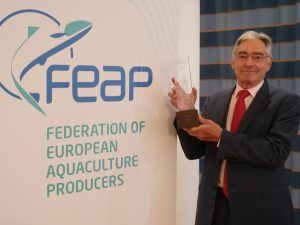
Gustavo Larrazábal, FEAP AWARD 2023
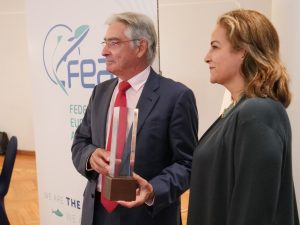
Gustavo Larrazábal with Lara Barazi, FEAP President
Mr. Gustavo Larrazábal, an engineer by education, initiated his path in aquaculture in 1984 in Spain. He drives today with mastery one of the most successful fish farming companies in Europe: Aquanaria SL. After almost forty years in the very complex seabass and seabream sector Gustavo has been able to build a company that excels in the production of a specialised fish product: extra-large fresh sea bass. Its fish are farmed offshore in the Canary Islands and are placed on high-level markets free from the risks and volatility of the usual fish commodities. A fish of superior quality that has raised the reputation of farmed fish in general to their highest position ever, well above wild fish, in the most reputed European restaurants. To reach this situation Mr Larrazábal has skilfully survived during 39 years the deadly boom and bust cycles of the Mediterranean sea bass and sea bream sector.
His company was previously called Tinamenor SA, based in North Spain. A name already engraved in the history of European aquaculture. This was one of the first hatcheries of seabass and seabream in Europe, besides of other species like turbot, sole and several molluscs. Since the early days of Mediterranean aquaculture, when mass production of juveniles was a dream, Gustavo pioneered the production of juveniles and successfully delivered them throughout Europe. His enthusiasm and hard work boosted Mediterranean aquaculture from its first required stage in the early eighties: hatchery production of quality juveniles. This undertaking expanded its activities to on-growing sea bass in the Canary Islands and there it continues successfully today under the Aquanaria brand.
In Spain, APROMAR, the Spanish aquaculture association, was founded in 1986 when marine fish aquaculture in the Mediterranean was at its inception. Spanish fish farmers quickly understood the importance of collaboration. Gustavo was one of the leaders at that time, alongside Mr Lazaro Rosa (Cupimar SA) that, by the way, received the FEAP Award in 2010 in Malta. Mr Larrazábal became the first president of APROMAR in 1986 and was continuously and unanimously re-elected for the post until 2003. Gustavo continues today to be a key member of the Board of APROMAR.
The Federation of European Aquaculture Producers (FEAP) was founded in 1968 as the Federation Européenne de la Salmoniculture (FES). When the federation expanded its scope and embraced Mediterranean aquaculture in the early nineties Gustavo was one of the drivers for bringing the issues of sea bass and sea bream to European level, alongside other Greek and French entrepreneurs. During his tenure in the Management Committee of FEAP the European Commission began to consider aquaculture separately from capture fisheries, for example through the Advisory Council for Fisheries and Aquaculture (ACFA), and numerous research initiatives were launched. Gustavo has been Vice-president of the FEAP from 2003 until 2019. At all times he has provided a clear business sense to the governance of the federation. He still today actively participates in FEAP’s activities and meetings.
Historically, FEAP always understood the importance of innovation for a sustainable and profitable fish farming sector. With this perspective, the federation initiated in 2007 the creation of the European Aquaculture Technology and Innovation Platform (EATiP). Gustavo became its first President in 2009. He still holds that position today, steering with competence the technology platform as it continues to be well-considered throughout the sector and in the European Commission. EATiP has been showcased by the European Commission as an example of a valuable technology platform. It has expanded its reach through the creation of Mirror Platforms in most European countries and continues bringing young professionals into the sector. In this altruist work, Gustavo has always expressed that he dedicates his time in EATiP with pleasure as his will is to give back to society what he has received during his thirty-nine years in the profession, and passes the ‘baton’ to the younger generations.
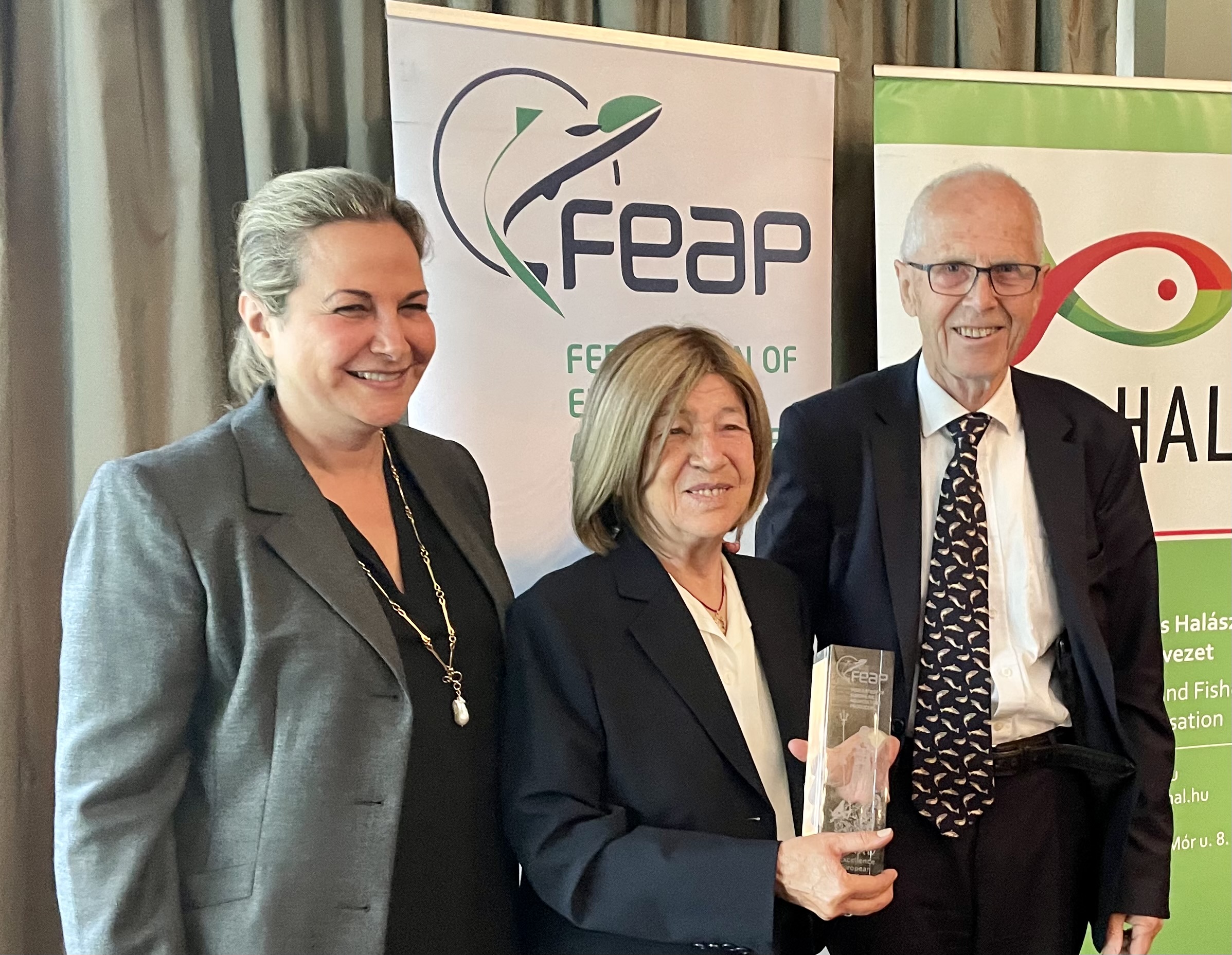
Ms Nancy Panteleimonitou has dedicated over 35 years of her life to the Mediterranean aquaculture sector and was a pioneer in the development of the industry from a scientific as well as a management perspective. Ms Panteleimonitou has been the only female founder of an aquaculture company in the entire sector and the first woman to be CEO of an aquaculture company globally.
Established in 1987, Galaxidi Marine Farm, is the lifework of Ms Nancy Panteleimonitou, who has dedicated her career to producing and exporting top-quality fresh fish to the world. Nancy, a well-respected figure among her peers, her colleagues and the people of the city of Galaxidi (Greece), is considered the first lady of aquaculture. In 1987, the pioneering Norwegian company Marine Farm ASA sought a partner for the production of Mediterranean species, and they understood that she was the best candidate they could hope for. She cofounded Galaxidi Marine Farms together with global industry pioneer Mr Bjørn Myrseth and a team of scientists from the UK. She became the CEO of the new company.
Ms Panteleimonitou and her team were instrumental in developing animal husbandry techniques and commercial hatchery know-how which formed the basis for the growth of many other companies in the industry. Under her leadership, Galaxidi Marine Farms has participated in or led hundreds of research and development programs, pioneering research into genetic selection, reproduction, on-growing animal husbandry techniques, nutrition and the development of new species.
Nancy was also a founding member of the Federation of Greek Maricultures (FGM) and the first representative from Greece to the Medaqua Commission of the FEAP which she helped establish as a forum for sea bass and sea bream farmers. She has served on the boards of FGM as well as the Hellenic Aquaculture Producers Organization (HAPO) for many years.
Ms Panteleimonitou’s passion and devotion to fish farming, have made Galaxidi Marine Farms an exceptional company. What is perhaps less known about her, principally because of her modesty, is that she has tirelessly and generously been a benefactor to her town of Galaxidi. Her passion for fish farming is matched by her passion for philanthropy, for helping those less fortunate. Her investment in the community was instrumental in reviving the town of Galaxidi and she is the largest employer in the region supporting local schools, hospitals and retirement homes and countless individuals. Apart from her success as a self-made entrepreneur she is above and before all a mother figure to her extended family of colleagues, neighbours and employees.
Ms Nancy Panteleimonitou is a true role model as a leader, an entrepreneur, a pioneer, a woman and a philanthropist. The FEAP is honoured to have delivered the 2022 Award to her.
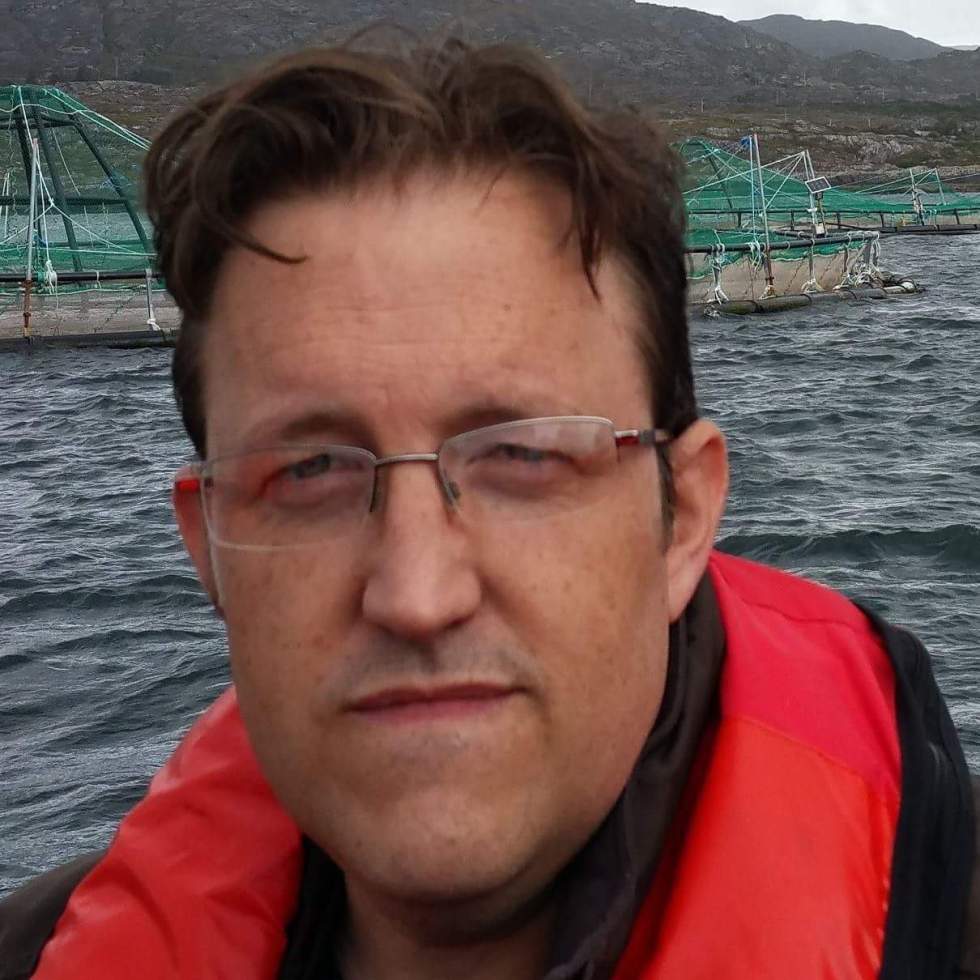
Richie Flynn was responsible within the IFA for aquaculture in Ireland since 1996 which led to international work within the FEAP, the European Mollusc Producers Association (EMPA) and the International Salmon Farmers’ Association (ISFA), while also working closely with the Marine Institute and Seafood Development Agency of Ireland. Later, he chaired the Working Group on Aquaculture of the Advisory Committee on Fisheries and Aquaculture of the European Commission and, from 2016, the Aquaculture Advisory Council.
The FEAP Award for Excellence in European Aquaculture was given posthumously to Richie Flynn at a special event organised in his memory by the Irish Farmers’ Association (IFA) and the FEAP.
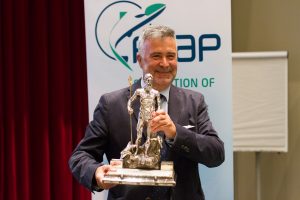 Stefano Cataudella, incomparable working history and starting at a very young age, has dedicated his whole life and professional career to develop aquaculture in the Mediterranean basin and around the world.
Stefano Cataudella, incomparable working history and starting at a very young age, has dedicated his whole life and professional career to develop aquaculture in the Mediterranean basin and around the world.
For his pioneering work and commitment he is recognised in many countries as an important agent of change that contributed to write the history of modern aquaculture. At the onset of marine aquaculture in the early 80’s, he started cooperating with the Food and Agriculture Organization of the United Nations (FAO) and actively participated and coordinated missions to support aquaculture development in all the Mediterranean countries, always promoting principles of environmental, social and economic compatibility later on enshrined in the Code of Conduct for Responsible Fisheries (CCRF).
In more than 40 years of work, he visited over 100 countries in Africa, Asia and Latin America in the frame of developing projects with particular reference to aquaculture and coastal lagoon management. His professional accomplishments include also the coordination and active involvement with numerous international organizations (FAO, European Commission, United Nations Development Program), as member of committees for various Italian ministries (Ministry of Agricultural, Food and Forestry Policies – MIPAAF, Ministry of Education, University and Research – MIUR, and Ministry for the Environment, Land and Sea – MATTM), and as the liaison with aquaculture farmers’ associations. He has always been very close to farmers and producers through an interactive dialogue that has kept him abreast of priorities and challenges in the sector while exchanging knowledge and professional competences. In 1996 he was nominated Chairperson of the Committee on Aquaculture of the FAO – General Fisheries Commission for the Mediterranean (GFCM), the Regional Fisheries Management Organisation (RFMO) while since 2011 he has become the GFCM Chairperson leading the process of modernisation of this organisation and coordinating the Task Force having the objective to elaborate the GFCM strategy for the sustainable development of Mediterranean and Black Sea Aquaculture. He is a Professor of Ecology at the University of Rome Tor Vergata, specialized in Fisheries and Aquaculture Biology. As university professor, S.C. has supervised more than 200 dissertations related to fish biology and aquaculture, “valliculture” and coastal lagoons management, and fisheries sciences. Many of his graduated students have continued their professional life in scientific research, as practitioners in fish farms and national and international organizations dealing with fisheries and aquaculture.
As scientist, throughout his long career, Mr Cataudella has dedicated himself to theoretical and applied research, publishing over 250 articles in peerreviewed journals, technical papers, and books. His entire scientific career has been devoted to finfish of economic interest (trout and salmon, sturgeons, eels, European seabass, gilthead seabream, tuna and greater amberjack), investigating new candidate’s species and fish quality improvement in a framework of sustainable aquaculture. He uses research tools in a synthetic approach to knowledge acquisition (cytogenetics, genetics, morphology, physiology, ecology, and space-time dynamics), developing multi-facet collaboration in coordinated programmes.
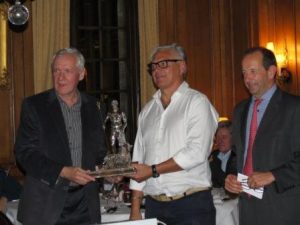 During the FEAP Presidents’ meeting, held in Brussels on 17th November, Mr László Váradi received the 2015 FEAP Award for Excellence in European Aquaculture. Decided by a jury composed of the previous recipients of the Award, following nomination by the Hungarian Aquaculture Association and the Hungarian Fish Farmers Association, the award was presented during the gala dinner of the FEAP Presidents’ meeting by Arnault Chaperon, FEAP President, and Patrick Lavens, New Business Development & Innovations Director at Inve Aquaculture.
During the FEAP Presidents’ meeting, held in Brussels on 17th November, Mr László Váradi received the 2015 FEAP Award for Excellence in European Aquaculture. Decided by a jury composed of the previous recipients of the Award, following nomination by the Hungarian Aquaculture Association and the Hungarian Fish Farmers Association, the award was presented during the gala dinner of the FEAP Presidents’ meeting by Arnault Chaperon, FEAP President, and Patrick Lavens, New Business Development & Innovations Director at Inve Aquaculture.
In a video presentation prepared by Ferenc Levai, his Hungarian colleague and FEAP delegate, László was recognised for dedicating his entire career in developing Hungarian aquaculture and freshwater pondfarming as well as for his strong involvement and cooperation with less developed countries.
László has been involved in aquaculture development since 1974 when he started to work in the Research Institute of Fisheries, Aquaculture and Irrigation (HAKI) in Hungary. Besides R&D activities aiming at the development of sustainable freshwater aquaculture systems and technologies in Hungary, he has also been involved in various aquaculture development projects in developing countries in Asia, Africa and Latin America mainly as an expert for the FAO. He was the director of HAKI for twenty years, from 1991 until his retirement in 2012. He obtained his PhD degree in 2001 with a thesis on the development of water efficient and environmentally-friendly aquaculture systems. He has been an active participant of numerous EU-funded research projects and European initiatives, contributing to the transfer of R&D results into practice in the field. He has placed high importance on the development of collaboration between Eastern and Western European aquaculture institutions and organisations, initiating the establishment of the Network of Aquaculture Centres in Central and Eastern Europe (NACEE) for which he has been the President since its foundation in 2004. He has also been the President of the European Aquaculture Society (EAS) between 2006 and 2008, and a strong supporter of its international conferences. He is currently President of the Hungarian Aquaculture Association and is also Chief Technical Adviser of the Hungarian Aquaculture Technology and Innovation Platform (HUNATiP).
The FEAP delegates warmly welcomed László’s nomination, recognising his commitment to aquaculture development in both Eastern Europe and far beyond, in addition to the excellence of his contributions to interdisciplinary research, knowledge and technology transfer and aquaculture development in less developed countries.
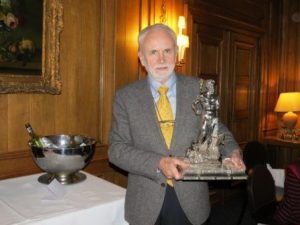 During the FEAP Presidents’ meeting on 2nd December in Brussels, Mr Želimir Filic received the 2014 FEAP Award for Excellence in European Aquaculture. Decided by a jury composed of the previous recipients of the Award, following nomination by a FEAP Member Association, the award was presented during the gala dinner of the FEAP Presidents’ meeting. In the presentation by the FEAP President, Arnault Chaperon, Želimir Filic was recognised for dedicating his entire career in developing the technology of fish and shellfish farming as well as upbringing aquaculture to become a distinctive and important economic sector.
During the FEAP Presidents’ meeting on 2nd December in Brussels, Mr Želimir Filic received the 2014 FEAP Award for Excellence in European Aquaculture. Decided by a jury composed of the previous recipients of the Award, following nomination by a FEAP Member Association, the award was presented during the gala dinner of the FEAP Presidents’ meeting. In the presentation by the FEAP President, Arnault Chaperon, Želimir Filic was recognised for dedicating his entire career in developing the technology of fish and shellfish farming as well as upbringing aquaculture to become a distinctive and important economic sector.
After graduating from the Faculty of Marine Fisheries (Szczecin, Poland) in the early ’70s, Želimir started work at the Ruðer Boškoviæ Institute, Center for Marine Research (Rovinj, Croatia). Investigating sea bass and sea bream, his first studies covered artificially-controlled spawning and larval and juvenile development. He soon established a laboratory with a prototype hatchery and cage facilities for fish culture which was one of the first in Europe at that time. This pioneering work enabled the implementation of this scientific knowledge to mass production in the sea. At the beginning of the ’80s, pilot farms for mass production of fish and shellfish farming in polyculture were installed in Lim bay, Croatia, as a part of the fish and shellfish processing company ‘Mirna’ (Rovinj, Croatia). Želimir joined as the of Head of department of the ‘Center for Mariculture’ which later became a joint-stock company for mariculture named ‘Marimirna’. Establishing and organizing a fish farming company opened many challenging projects for Želimir, like the construction of an industrial hatchery and providing technical solutions for the pregrowth of fingerlings using warm cooling seawater from the thermal power plants. His production of fine fish products like smoked and marinated fillets of sea bass and sea bream were even recognized as a delicacy by winning the prestigious Seafood Prix d’Elite in 2004 at the European Seafood Exposition in Brussels.
Želimir was, and still is, an active member of many recognized national and European associations of aquaculture. During his career, he was coordinator of the FAO project ‘MEDRAP’, member of the Presidency of the European Aquaculture Society (EAS), member of the Economic Council of the Chamber of Economy for Region of Istria, Croatia, President of Aquaculture Association, Croatian Chamber of Economy (Zagreb, Croatia), member of the Working Group on Fisheries and the Working Group on Food Safety in the negotiations for Croatian accession to the EU, National Representative in the FEAP and Vice President of FEAP’s Mediterranean Aquaculture Commission.
The FEAP delegates warmly welcomed Želimir’s nomination, recognising his commitment to aquaculture development in the Mediterranean and the excellence of his contributions in promoting Croatia mariculture and its products.
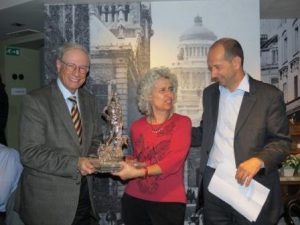 Mrs Yvette White received the 2013 FEAP Award for Excellence in European Aquaculture. The award was presented during the gala dinner after the FEAP Presidents’ meeting on 5th of November in Brussels, and was decided by a jury composed of the previous recipients of the Award, following nomination by a FEAP Member Association.
Mrs Yvette White received the 2013 FEAP Award for Excellence in European Aquaculture. The award was presented during the gala dinner after the FEAP Presidents’ meeting on 5th of November in Brussels, and was decided by a jury composed of the previous recipients of the Award, following nomination by a FEAP Member Association.
In the joint presentation by the FEAP President, Arnault Chaperon and Prof. Constantin Vamvakas, who was the award winner of 2007, Yvette White was recognised for her continuous contributions to European aquaculture.
Atypically, Yvette White came to the aquaculture world through her language skills. She started working for Shearwater Fish Farming Ltd (UK) in 1978 when the company decided to start a marine fish farm in France. She moved to the French site ‘Ferme Marine de Douhet’ at its creation in 1980, as a co-director. In 1989, the Stolt Sea Farm group, who had by then taken over the company, opened an office in Bordeaux to run all its EU marine fish farming subsidiaries. Yvette White took over the administration and financial management of Stolt Sea Farm Europe. She was already heavily involved in the French Marine fishfarming association as a board member, and when Stolt Sea Farm closed the Bordeaux office as part of the restructuring of its European business, she became general secretary of the association (SFAM) in 1994. The association then became a member of the French Federation of Aquaculture (FFA), of which Yvette White became the general secretary in 1999. The Interprofessional Committee of Aquaculture Products (CIPA) is composed of three ‘colleges’: producers (represented by FFA), processors and feed manufacturers. It defends the interests of the French aquaculture sector and promotes the image of aquaculture products. In order to assure perfect synchronisation between the work done by FFA and that done by CIPA, it was decided in 2004 that the two structures should be run by the same president and the same general secretary. Yvette White has been general secretary of the three structures (SFAM/FFA/CIPA) since then. In 2012, she received the most prestigious honour in France, the “Légion d’Honneur”, created by Napoléon.
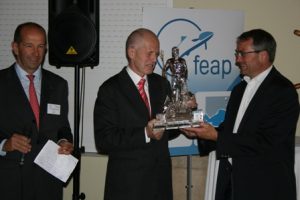 Mr. Bjørn Myrseth receives 2011 FEAP Award for Excellence in European Aquaculture. The award was presented during the FEAP Presidents’ Meeting, held in Rhodes on 17-18 October 2011, and was decided by a jury composed of the previous recipients of the Award, following nomination by a FEAP Member Association.
Mr. Bjørn Myrseth receives 2011 FEAP Award for Excellence in European Aquaculture. The award was presented during the FEAP Presidents’ Meeting, held in Rhodes on 17-18 October 2011, and was decided by a jury composed of the previous recipients of the Award, following nomination by a FEAP Member Association.
Presented jointly by the FEAP President, Arnault Chaperon and Robin Wardle, Director of Technical Services and Customer Support for MSD Aquatic Animal Health, Bjørn Myrseth was recognised for his long-standing contributions to European aquaculture.
Bjørn Myrseth has had an exceptional career, being active on many fronts since he graduated with a Master’s Degree from the University of Bergen in 1971. Almost immediately, he became a founder of Stolt Sea Farm, which was specialized in the production of salmon smolts first in Norway, then in Scotland, USA and Canada. Later, market size Atlantic salmon was produced and Bjørn Myrseth was the key driver of the company’s involvement in sturgeon farming in California. He then looked to diversify his interests and, through Marine Farms AS where he was CEO, made investments in Greece, UK and Chile. Marine Farms was listed on the Oslo Stock Exchange in 2006, having operations in the UK (salmon), Belize (cobia), Vietnam (cobia) and in Spain (seabass and seabream).
He has been a long-time supporter of cooperation and openness in developing aquaculture and, already in 1976, was a co-founder of the European Mariculture Society – the precursor of the European Aquaculture Society (EAS). While active in founding regional and national aquaculture associations in Norway, he was elected President of EAS in 1992.
It is this combination of personal interest in discovering developments and applying innovation in marine aquaculture that have driven his professional career and has meant that his expertise, experience and insight are regularly sought by many. Due to Bjørn’s long tenure and active involvement in the development of aquaculture, he is considered to be one of the pioneers of the modern fish farming industry. In receiving his award, Bjørn said that he was slightly surprised to receive an award for just doing his job, noting that he was not yet finished!
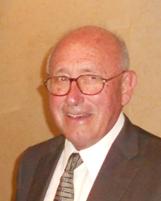 D. Lázaro Rosa Jordán is the pioneer of the Mediterranean Marine Aquaculture, as highlighted by Gustavo Larrázabal, Vice-President of the FEAP, in a touching presentation of D. Rosa’s life and brilliant carreer. He stressed his human values, his entrepreneurial spirit through the company CUPIMAR and dedication to public service early in his career in the Marine Social Institute, in the FROM (of which he was the first President) and as General Secretary Assistant of Fisheries.
D. Lázaro Rosa Jordán is the pioneer of the Mediterranean Marine Aquaculture, as highlighted by Gustavo Larrázabal, Vice-President of the FEAP, in a touching presentation of D. Rosa’s life and brilliant carreer. He stressed his human values, his entrepreneurial spirit through the company CUPIMAR and dedication to public service early in his career in the Marine Social Institute, in the FROM (of which he was the first President) and as General Secretary Assistant of Fisheries.
Mr. Larrazábal also emphasized D. Lázaro Rosa’s efforts in the promotion of employers associations through the Spanish Association of Marine Fish Farmers APROMAR (of which he was Vice-President for 17 years and that that he is currently managing) and his push for the implementation of the foundation Aquaculture Technology Centre of Andalucía (CTAQUA), which he currently chairs.
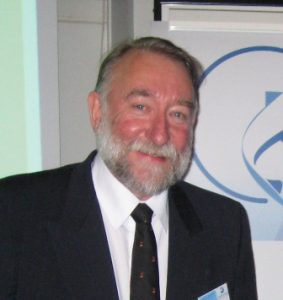 Prof. Randolph Richards has played a major role in the emerging aquaculture industry in Scotland, being Veterinary Adviser from 1989 to a succession of key industry associations, including the Scottish Salmon Growers’ Association, Scottish Quality Salmon and the Scottish Salmon Producers’ Organisation.
Prof. Randolph Richards has played a major role in the emerging aquaculture industry in Scotland, being Veterinary Adviser from 1989 to a succession of key industry associations, including the Scottish Salmon Growers’ Association, Scottish Quality Salmon and the Scottish Salmon Producers’ Organisation.
He has been an active member of a number of joint government/industry working groups and has contributed to the development of industry codes of practice, the Scottish Framework for sustainable Aquaculture and the Scottish Aquaculture Bill. He has played a key role in the development and management of the Institute of Aquaculture, University of Stirling, which has made a major contribution to global aquaculture. Under his leadership, the Institute’s international reputation in both research and postgraduate teaching has developed enormously.
Professor Richards’ own reputation is recognised by his membership of the UK research Assessment Exercise panel for 2008 and of the international panel of Norway’s Research Council Centres of Excellence Scheme since 2001.
As a leading fish disease specialist, he has coordinated large EU research programmes on fish diseases and is currently the UK representative of a tri-nation research forum investigating a key salmon disease.
He is also a Facilitator in the area of Fish Health and Welfare in the recently formed European Aquaculture Technology and Innovation Platform, which informs the EU of industrial research priorities.
He has been recognised by the farming community with the award of the Fellowship of the Royal Agricultural Societies and last year received a prestigious award at the Aquaculture Today conference for his outstanding contribution to Aquaculture.
He is currently a director of the internationally renowned Moredun Research Institute at Edinburgh, which carries out wide-ranging research into animal diseases.
Professor Richards has contributed to wider discussions on fisheries and veterinary matters and was a member of the Royal Society of Edinburgh Inquiry into the Future of the Scottish Fishing Industry (2004) and the UK’s Veterinary Products Committee (which licences all animal medicines) for more than eight years. During this period, the Committee oversaw the development of medicines which helped control the potentially devastating problem of sea lice infestation.
Much of the research required for licensing these products and the development of vaccines controlling both bacterial and viral disease were carried out by Professor Richards and his colleagues at IoA, Stirling and Machrihanish.
In June 2008, upon the announcement Professor Richards would stand down as Director of the Institute of Aquaculture at the University of Stirling, Professor Randolph Richards, was given the significant honour of being appointed CBE in the Queen’s Birthday Honours List in tribute to outstanding achievement and service across the community and the nation as a whole and in recognition of his services to veterinary science.
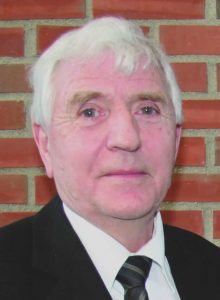 Mr. Tore Håstein is one of the first veterinarians in Europe to dedicate all his professional time to knowledge and prophylaxis of diseases in fish. Born in 1937, he has a PhD from University of Stirling. Through all his career fish and fish farming has been a core interest.
Mr. Tore Håstein is one of the first veterinarians in Europe to dedicate all his professional time to knowledge and prophylaxis of diseases in fish. Born in 1937, he has a PhD from University of Stirling. Through all his career fish and fish farming has been a core interest.
He was a seriously contributing pioneer both nationally and internationally, building scientific knowledge and contributing heavily to the development of fish farming. He has always been and still is actively committed to discussing fish health issues with fish farmers, contributing to continuous improved standards in the industry.
As pioneer he often had to fight the barricades on behalf of the fish farming industry, both in pure scientific questions and to get the fish farming perspective into new regulations and governance.
Without his effort it is doubtful if the salmon farming industry and also European fish farming in general would have been where the industry is today, as a sunrise industry developing for the future.
Tore Håstein was the first leader of the special laboratory for fish diseases at the Veterinary Institute in Oslo (1967 – 1975). Veterinary inspector in fish diseases until 1985, and special veterinarian for fish diseases until 2000. Director for Division for fish- and shellfish health at the National Veterinary Institute until 2005. He is now senior adviser at the institute.
His list of publications covers more than 100 articles, in addition numerous popular articles describing complex fish health issues to the fish farmers.
Vice President of the Fish Disease Commission in World Organization for Animal Health (OIE) 1988-1991. President in OIE from 1991 until 2003.
As president in the Fish Disease Commission he was leading the development of international regulations as “International aquatic animal health code” and “Diagnostic Manual for Aquatic Animal Diseases”. These two books are well recognized and used as standard background for other national and international regulations.
For many years he contributed heavily to the development of fish health regulations in EU.
He has received the St.Olav medal from the King of Norway for his work.
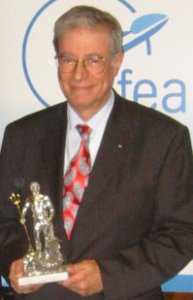 Prof. Constantin Vamvakas joined the European Commission in 1983, where he has been in charge of the “Aquaculture Unit” for some 10 years . Before joining the EC, he worked from 1974 to 1978 as a senior researcher and lecturer in the Department of Zoology of the University of Athens. From 1978 to 1982 he was the Director General of the Hellenic Centre of Marine Research (formally Institute of Oceanographic and Fisheries Research of the Ministry of Co-ordination) in Greece. He was among the pioneers, who believed in the future of the aquaculture sector.
Prof. Constantin Vamvakas joined the European Commission in 1983, where he has been in charge of the “Aquaculture Unit” for some 10 years . Before joining the EC, he worked from 1974 to 1978 as a senior researcher and lecturer in the Department of Zoology of the University of Athens. From 1978 to 1982 he was the Director General of the Hellenic Centre of Marine Research (formally Institute of Oceanographic and Fisheries Research of the Ministry of Co-ordination) in Greece. He was among the pioneers, who believed in the future of the aquaculture sector.
He is currently the Adviser to the Director General in the Directorate General for Fisheries and Maritime Affairs of the European Commission and his work concerns, primarily, the fisheries policy in the Mediterranean Sea.
In the course of his duties in the European Commission he served the last sixteen years as Head of Unit and was in charge of the “Aquaculture Unit” for some 10 years. In this position, he was responsible for the management and co-ordination of the structural policy for aquaculture in the European Union and for the negotiations of the multiannual guidance programmes on aquaculture with the member States. He headed the preparation, co-ordination and negotiations among the European Institutions and the stakeholders for the establishment of “A Strategy for the sustainable development of European Aquaculture” in 2002 and, after its adoption by the European Institutions, for the co-ordination of its implementation.
He was also Head of Unit in the Structures Directorate of DG Fisheries and Maritime Affairs, responsible for the follow up of the Financial Instrument for Fisheries Guidance (FIFG) in a number of countries and was actively involved in the preparation of the European Fisheries Fund, particularly on the chapters concerning aquaculture, processing and marketing.
Constantin Vamvakas acquired wide experience in negotiations within a range of international fora, and headed, as a Commission official, negotiations on technical, scientific, economic and political matters. This meant participation in a large number of international meetings concerning the Mediterranean Sea, the Atlantic, Pacific and Indian Oceans and Antarctica, several times as the head of the European Community delegation. In addition, he has represented Greece as a National Representative in different international teams and has been an expert and consultant to many international organizations (for example, the FAO and the Council of Europe) as well as being a member of the Governing Councils of different national and international scientific Committees and Associations.
In his capacity as a Professor of the University of Ghent, Belgium, he lectures on aquaculture to post-graduate students of an international Master of Science in Aquaculture; his course title is “Management in the Aquaculture Industry”.
This long and varied career, covering a diverse range of representative positions within science, administration and policy forming, has one common theme – the development of European aquaculture. It was therefore with great pleasure that the presentation was made by the President of the FEAP, John Stephanis, and Robin Wardle, Director of Global Marketing and Technical Services for Schering Plough Aquaculture.
John Stephanis noted that the curriculum of Constantin did not really indicate the measure of commitment that he has provided to the European aquaculture sector over the years and that several important actions of the FEAP had been initiated through his support, always providing valuable advice and encouragement – independent of whether the issue was difficult or impossible to resolve.
Robin Wardle stressed the importance of good consultation between the administrative and professional sides of aquaculture so as to be able to establish the supportive environment that European aquaculture needs to develop and stressed the commitment of Schering Plough Aquaculture to supporting such development attitudes.
Constantin Vamvakas has strong personal interests in art and literature and was accompanied in Rome by his wife, Marina, who is an accomplished artist and author. In a short acceptance speech, Constantin underlined the personal pleasure that he has experienced throughout his historical and continuing dedication to assisting the development European aquaculture.
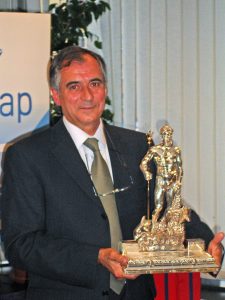 Mr. Jean-Jacques Sabaut spent his entire career in the development of feeds, working mainly in France. After starting in academic research in the 1970s, investigating the nutritional requirements of seabream, he moved to industry and joined ‘Aqualim’, a subsidiary of ‘Les Grands Moulins de Paris’.
Mr. Jean-Jacques Sabaut spent his entire career in the development of feeds, working mainly in France. After starting in academic research in the 1970s, investigating the nutritional requirements of seabream, he moved to industry and joined ‘Aqualim’, a subsidiary of ‘Les Grands Moulins de Paris’.
He worked on the development of specialist fish feeds for many years and, in the eyes of many, contributed significantly to the development of Mediterranean fish farming when it was in its infancy.
Eventually, he became more involved with the business side of the fish feed sector and occupied senior management positions within ‘Aqualim’, which later became ‘Biomar France’.
Mr. John Stephanis, President of the FEAP, admitted that ‘when I started ‘Selonda Aquaculture’, 25 years ago, ‘J.J.’ was my teacher, my advisor and a strong engine to push me forward. I still remember the days and nights that he gave me private lectures on what to do in Mediterranean aquaculture’.
His dynamism and commitment on the professional front was mirrored by his efforts to promote associative structures for the promotion and representation of aquaculture, being the founder of the French Association for the Development of Aquaculture (ADA). He was President of the European Aquaculture Society between 1988 and 1990 and also presided over the French professional organizations concerned with aquafeed manufacture.
More recently, he committed many efforts to the French Interprofessional Committee for Aquaculture Products – the CIPA – bringing his expertise to the creation and operation of this important French aquaculture organization. Finally, he was a representative in the newly-founded Fish Feed Committee of the European Federation of Compound Feed Manufacturers (FEFAC).
The award was presented to Mr. Sabaut by Professor Patrick Smith of Schering-Plough Animal Health Corporation. Professor Smith, a 30-year veteran of the aquaculture industry, has dedicated his professional career to fish health. He joined the fish diseases lab in 1975, where he spent four years working on fish immunology before moving to Norway to continue his work in fish immunology at Tromsø Universityfor fish diseases. In 1982 Professor Smith established Aquaculture Vaccines Limited (AVL), where he pioneered the first ever commercialization of fish vaccines. Today, Pr Smith heads up the business development and project feasibility department for Schering-Plough Animal Health’s dedicated aquaculture business unit.
In presenting the award, Professor Smith reaffirmed Schering-Plough’s commitment to the aquaculture industry and highlighted its continuing investment in the European industry where seven vaccines either have been granted registration through the European mutual recognition procedure or are in the pipeline for application to the decentralized procedure. Europe is also where continuing investment in innovative research-based health solutions has seen numerous vaccines developed for a variety of species, including marine fish species, a sector to which Mr Jean-Jacques Sabaut has made valuable contributions through his life-long career involvement in fish nutrition as well as his representation within the profession.
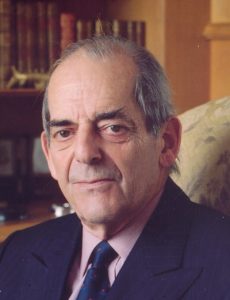 Baron Charles de Fierlant Dormer has been active in the rearing of freshwater trout in the Ardennes area of Belgium for over 40 years. Significantly, he was also one of the driving forces for the establishment of a European Federation for fish farmers in the 1960s which was incorporated as the European Federation of Salmoniculture [FES] in 1968 and he was responsible for European Affairs within this fledgling organisation.
Baron Charles de Fierlant Dormer has been active in the rearing of freshwater trout in the Ardennes area of Belgium for over 40 years. Significantly, he was also one of the driving forces for the establishment of a European Federation for fish farmers in the 1960s which was incorporated as the European Federation of Salmoniculture [FES] in 1968 and he was responsible for European Affairs within this fledgling organisation.
After being a Vice-President of the FES, Baron de Fierlant Dormer became President in 1993. With the request of adhesion from the Federation of Greek Maricultures, the first non-salmonid fish farming Association, the FES changed its statutes to become the FEAP. This change in structure resulted in a rapid expansion and differentiation of the Federation’s scope and activities during his Presidency. The award was presented to Baron de Fierlant Dormer by the President of the FEAP, Mr. John Stephanis, and Mr. Rod Watson, Senior Director Europe, Africa and Middle East of Schering-Plough Animal Health, and in the presence of Commissioner Joe Borg of the Director-General of Fisheries and Maritime Affairs.
Mr. Watson, in presenting the award, affirmed the commitment of Schering-Plough to develop innovative research-based health solutions for the future and to apply the same passion, commitment and professionalism for European aquaculture as so admirably personified by Baron de Fierlant Dormer.
John Stephanis expressed his extreme pleasure that the FEAP has inaugurated this annual event and that someone who has contributed so much to the development of the FEAP’s activities was the first recipient. He said “It gives me, as President, and all of the representatives of the FEAP an immense pride to present this award to someone that we admire so much”.
